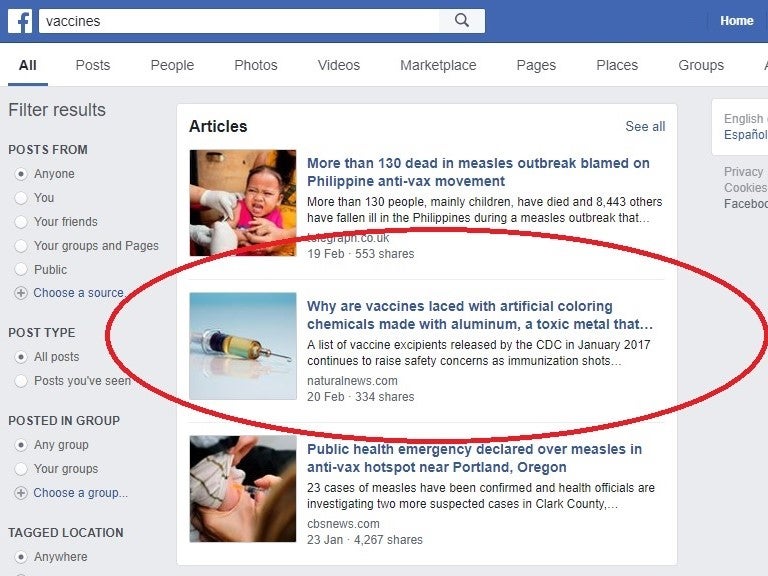Pinterest offers cure to anti-vax propaganda
WHO says the anti-vaccine movement one of the worst health threats facing humanity in 2019

Your support helps us to tell the story
From reproductive rights to climate change to Big Tech, The Independent is on the ground when the story is developing. Whether it's investigating the financials of Elon Musk's pro-Trump PAC or producing our latest documentary, 'The A Word', which shines a light on the American women fighting for reproductive rights, we know how important it is to parse out the facts from the messaging.
At such a critical moment in US history, we need reporters on the ground. Your donation allows us to keep sending journalists to speak to both sides of the story.
The Independent is trusted by Americans across the entire political spectrum. And unlike many other quality news outlets, we choose not to lock Americans out of our reporting and analysis with paywalls. We believe quality journalism should be available to everyone, paid for by those who can afford it.
Your support makes all the difference.Pinterest has updated its search policy in an effort to stifle the spread of disinformation campaigns from the controversial anti vax movement.
The move follows a spike in vaccine-preventable diseases around the world, fueled by anti-vaccine propaganda promoting that has plagued social media platforms in recent years.
Refusal to immunise children on the part of so-called anti-vaxxers comes from the misguided belief in scientifically disproven claims that vaccinations are harmful and can cause autism.
Pinterest's update means users can still post vaccine-related content to their pages but searches related to vaccinations will no longer return results.
"If a search returns largely polluted results that violate our policies, we will stop serving the query, either temporarily," a spokesperson for Pinterest said.
"We started blocking certain searches related to vaccinations and cancer cures last year because results were leading to harmful misinformation."
One of the diseases making a comeback is measles, which has seen a 30 per cent spike in cases worldwide, including in countries where it had been almost eliminated.
Last month, the World Health Organisation (WHO) labelled the anti-vaccine movement one of the worst health threats facing humanity in 2019.
"The reasons for this rise are complex, and not all of these cases are due to vaccine hesitancy," the WHO said.
"However, some countries that were close to eliminating the disease have seen a resurgence."
Pinterest is among several social media and technology companies facing criticism for their perceived roll in allowing ant-vax propaganda to spread.
US Representative Adam Schiff wrote a letter in February to Facebook CEO Mark Zuckerberg asking for the social network to address the problem.
"I am writing out of my concern that Facebook and Instagram are surfacing and recommending messages that discourage parents from vaccinating their children, a direct threat to public health," he wrote.
Facebook responded by saying it is "exploring additional measures to best combat the problem", such as demoting this type of content in search results.
Despite this, anti-vaccine content was still appearing in top results in searches carried out by The Independent using terms like 'vaccines' and 'vaccination'.

Google also stated recently that it is working to restrict the spread of anti-vaccination content, with one potential solution being the inclusion of panels at the top of search results that contain information from scientifically sound sources.
However, going to the lengths that Pinterest has gone to will not be possible for Google without serious censorship questions being raised.
Join our commenting forum
Join thought-provoking conversations, follow other Independent readers and see their replies
Comments